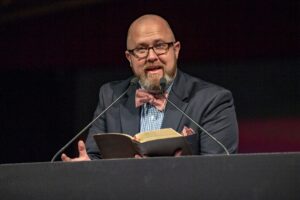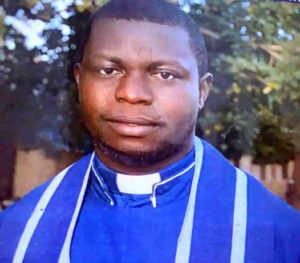
WAKE FOREST, N.C. (BP)–Christians need to have an understanding of basic Christian apologetics in order to successfully dialogue with a lost postmodern world and ready their minds to hear the Gospel, Norman Geisler said Feb. 12 in a chapel message at Southeastern Baptist Theological Seminary in Wake Forest, N.C.
Geisler, a leading evangelical apologist and president of Southern Evangelical Seminary in Matthews, N.C., pointed out that the entire evangelistic technique employed by many Christians today is predicated on the belief that God does exist, a notion many postmodernists may not be willing to embrace.
Therefore, Geisler said, pointing to the Apostle Paul’s defense of the faith at Mars Hill in Acts 17 as an example, Christians must be able and willing to reason with the lost, “casting down arguments and every high thing that exalts itself against the knowledge of God, bringing every thought into captivity to the obedience of Christ.”
“If a person doesn’t believe in God,” Geisler said, demonstrating the evangelical imperative behind his apologetics, “they cannot believe in the Son of God. You cannot separate apologetics from evangelism.”
Given the context in which the church finds itself today, he said it is increasingly important that Christians argue for the existence of God and absolute truth, a belief that has fallen out of fashion to many today.
“Every pastor must be an apologist,” Geisler said. “If you speak the truth of the Gospel and they don’t even believe in [the concept of] truth, what good does it do you?
“Every system of unbelief has a self-defeating argument,” Geisler said, referring specifically to the claim that absolute truth does not exist, which is itself a truth claim. “You can’t deny truth without affirming truth. Anyone who denies it affirms it.”
Next, Geisler challenged the notion of religious pluralism, which would have all religions be tolerated equally as reliable paths to truth.
“Opposites can’t be true,” he said, using the examples of Christianity and Islam, which denies the divinity of Christ. “Somebody’s wrong; we can’t both be right. We believe the heart of the Gospel is that Jesus died and rose from the dead. Somebody’s got to be wrong.
“Truth is narrow,” he continued. “Even a pluralist who says pluralism is true is excluding all non-pluralists. Don’t be ashamed to say, ‘Jesus said, ‘I am the way, the truth and the life. No one comes to the Father except through Me.'”
–30–














